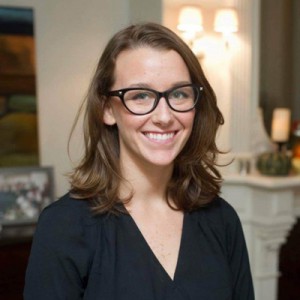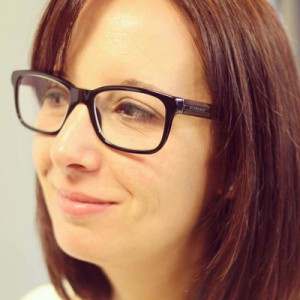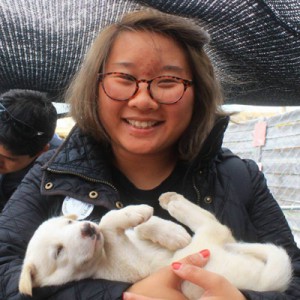I Want to Sit Next to a Woman

At humanist conferences, gatherings, and events, I look around and often find myself wondering, “Where are all the women?” At the American Humanist Association conference this past May, my mouth dropped when I saw on the schedule a talk by Elsa Roberts (co-president of Secular Woman) entitled “Should Humanists Be Feminists?” It was important and necessary, but it’s hard to believe that we’re really still asking that question. How is it not obvious that humanism needs to embrace women, along with trans, genderqueer, and non-binary folks? That humanism needs to lift up their voices and create spaces they want to be in?
We need to do this not only because it’s the right thing to do (after all, it’s 2016, and women are people) but for the success of the secular movement. We won’t succeed without more gender diversity. Feminism needs to be a stated value of humanism, not a question in our minds.
I’m not the only one thinking about gender and humanism. There is an entire conference dedicated to this intersection, Women in Secularism, the fourth iteration of which is happening in Arlington, Virginia, September 23-25. Secular Woman does great work to amplify female voices and celebrate our secular successes. College students like Kristen Kennedy are writing theses on the topic. The Humanist has many talented non-male writers. I could go on and on.
I decided to do some of my own research to find out why folks are or are not taking on the label of humanism, whether or not they participate in secular communities, and how these communities can adapt to appeal to a broader gender base. I’m collecting data through an inclusive survey of those who identify as nonbelievers (to participate, email me), and I have conducted interviews with three women so far. These women do not participate in atheist or humanist communities, but they are living out humanist values every day. How can we get such women to be a part of our movement, to take our label, and to attend our events? More importantly, how can we serve and support their values and missions?

Chelsea Norman
Chelsea Norman, a hard-working queer woman of twenty-five, grew up in poverty in rural Tennessee, taking advantage of many social services, including food stamps, free lunch, and Medicaid. Her sex education as a youth was minimal and inaccurate. Now she’s living in Washington, DC, and working intensely to expand reproductive healthcare access in anti-choice states through community organizing. Norman believes that “all people deserve healthcare that’s free of ideological biases and that access to abortion services is a critical piece of economic security for women.”
Norman identifies as a queer, nonreligious agnostic, though she once served as a Christian missionary. She believes in paying it forward and knows her impact on the world: “My feelings are contagious—which is both good and bad. I want to be a positive influence to people in my life…We are all feeding off of each other’s energies. I try to remember that every time a toxic thought or action comes out of me.” She says she’s driven by fairness and justice but unlike most other aspects of her life, which are informed by community influence and engagement, her agnosticism is something she prefers to think about and act on alone.

Dawn Bovasso
Dawn Bovasso, a thirty-nine-year-old creative director at DigitasLBI, is living, working, and parenting in Boston, Massachusetts. She finds great energy and community in her work: “My job is creative and innovative and demanding and full of people who are passionate and loving and who’d lie down in front of traffic for each other—and I can’t imagine a better place to go each day to earn money.”
Instead of raising her son in any religion, Bovasso puts her efforts toward instilling values she has spent the last thirty-five years cultivating for herself. She says she is unsure enough about religion to feel comfortable identifying with a particular label. “I believe in being kind, first and foremost. Most people are trying to do their best, and when we help each other be successful, we are all successful,” she said. Dawn has a love-filled, joyous life. She and her son decide what to do each night together, whether it’s going to the library or cooking a delicious meal. When he’s sleeping, she doesn’t rest–she reads avidly, refinishes old furniture, or thinks and writes about women’s inequality in the workplace. In her advertising career, she has experienced and witnessed how women “aren’t treated equally, aren’t paid equally, aren’t promoted at the same rate, and aren’t given equal opportunities” and works to correct the fact that “there aren’t role models or advocates for the younger women to look up to, learn from, or know are fighting for them.”

Stephanie Eng
Stephanie Eng is a Chinese American student from New Jersey studying international business at Northeastern University. Her driving goals are to raise up those who are not as privileged and, simply, to “be good.” She said, “The issue I want to dedicate my life toward is more and more equal representation for marginalized groups. I hope to work within the system to reform the way media is created and disseminated and to change people’s perceptions by providing a more multifaceted view of the human experience.” Eng cares most about healthcare and safety for trans folks, sensible gun control policies, and the dismantling of rape culture.
In order of importance, Eng’s priorities are mental health, physical health, academics, career, and social/family connections. She enjoys meditation and visiting museums, both of which she finds spiritually connective. She also remarked that she enjoys “bullshitting philosophy and talking about life” with her friends.
These women are living out humanist values everyday. They are thoughtful, driven, compassionate, and human-focused. I want to sit next to these women at humanist events—at author talks, volunteer days, discussions, meditation, conferences, and at a “Harry Potter and the Sacred Text” class. I want to turn to them, learn from them, and be a part of their lives. I want us to share the label of humanist and hold them in my community. I want our community to offer something of value to such women. We need their insight, their compassion, and their intellect. Our movement should support them in their work and family lives. So how do we do it? Check back in a few weeks to see the results of my survey.
